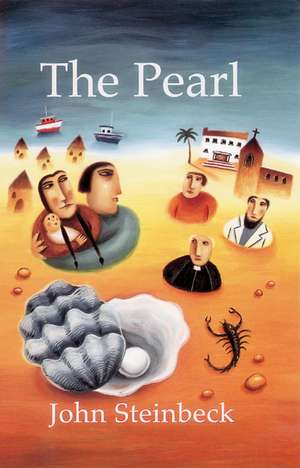The Pearl: Longman Literature Steinbeck
Autor John Steinbeck, Gavin Jonesen Limba Engleză Hardback – 31 aug 2000
When Kino discovers a magnificent pearl, he thinks that he has found security and comfort for his wife and son, but envy and greed almost destroy him.
Hardback 134pp
Preț: 107.02 lei
Nou
Puncte Express: 161
Preț estimativ în valută:
20.48€ • 22.24$ • 17.20£
20.48€ • 22.24$ • 17.20£
Carte indisponibilă temporar
Doresc să fiu notificat când acest titlu va fi disponibil:
Se trimite...
Preluare comenzi: 021 569.72.76
Specificații
ISBN-13: 9780582461475
ISBN-10: 0582461472
Pagini: 144
Dimensiuni: 129 x 198 x 13 mm
Greutate: 0.21 kg
Ediția:1
Editura: Pearson Education
Colecția Longman
Seria Longman Literature Steinbeck
Locul publicării:Harlow, United Kingdom
ISBN-10: 0582461472
Pagini: 144
Dimensiuni: 129 x 198 x 13 mm
Greutate: 0.21 kg
Ediția:1
Editura: Pearson Education
Colecția Longman
Seria Longman Literature Steinbeck
Locul publicării:Harlow, United Kingdom
Notă biografică
John Ernst Steinbeck was born in Salinas, California, on February 27, 1902 of German and Irish ancestry. His father, John Steinbeck, Sr. , served as the County Treasurer while his mother, Olive (Hamilton) Steinbeck, a former school teacher, fostered Steinbeck's love of reading and the written word. During summers he worked as a hired hand on nearby ranches, nourishing his impression of the California countryside and its people.
After graduating from Salinas High school in 1919, Steinbeck attended Stanford University. Originally an English major, he pursued a program of independent study and his attendance was sporadic. During this time he worked periodically at various jobs and left Stanford permanently in 1925 to pursue his writing career in New York. However, he was unsuccessful in getting any of his writing published and finally returned to California.
His first novel, Cup of Gold was published in 1929, but attracted little attention. His two subsequent novels, The Pastures of Heaven and To a God Unknown, were also poorly received by the literary world.
Steinbeck married his first wife, Carol Henning in 1930. They lived in Pacific Grove where much of the material for Tortilla Flat and Cannery Row was gathered. Tortilla Flat (1935) marked the turning point in Steinbeck's literary career. It received the California Commonwealth Club's Gold Medal for best novel by a California author. Steinbeck continued writing, relying upon extensive research and his personal observation of the human condition for his stories. The Grapes of Wrath (1939) won the Pulitzer Prize.
During World War II, Steinbeck was a war correspondent for the New York Herald Tribune. Some of his dispatches were later collected and made into Once There Was a War.
John Steinbeck was awarded the Nobel Prize for Literature in 1962 "....for his realistic as well as imaginative writings, distinguished by a sympathetic humour and a keen social perception".
Throughout his life John Steinbeck remained a private person who shunned publicity. He died December 20, 1968, in New York City and is survived by his third wife, Elaine (Scott) Steinbeck and one son, Thomas. His ashes were placed in the Garden of Memories Cemetery in Salinas.
After graduating from Salinas High school in 1919, Steinbeck attended Stanford University. Originally an English major, he pursued a program of independent study and his attendance was sporadic. During this time he worked periodically at various jobs and left Stanford permanently in 1925 to pursue his writing career in New York. However, he was unsuccessful in getting any of his writing published and finally returned to California.
His first novel, Cup of Gold was published in 1929, but attracted little attention. His two subsequent novels, The Pastures of Heaven and To a God Unknown, were also poorly received by the literary world.
Steinbeck married his first wife, Carol Henning in 1930. They lived in Pacific Grove where much of the material for Tortilla Flat and Cannery Row was gathered. Tortilla Flat (1935) marked the turning point in Steinbeck's literary career. It received the California Commonwealth Club's Gold Medal for best novel by a California author. Steinbeck continued writing, relying upon extensive research and his personal observation of the human condition for his stories. The Grapes of Wrath (1939) won the Pulitzer Prize.
During World War II, Steinbeck was a war correspondent for the New York Herald Tribune. Some of his dispatches were later collected and made into Once There Was a War.
John Steinbeck was awarded the Nobel Prize for Literature in 1962 "....for his realistic as well as imaginative writings, distinguished by a sympathetic humour and a keen social perception".
Throughout his life John Steinbeck remained a private person who shunned publicity. He died December 20, 1968, in New York City and is survived by his third wife, Elaine (Scott) Steinbeck and one son, Thomas. His ashes were placed in the Garden of Memories Cemetery in Salinas.
